Slot Effect on Wing Aerodynamic Performance, ANSYS Fluent Simulation Training
$80.00 $40.00 Student Discount
- The problem numerically simulates airflow over an airfoil (NACA4421) with a slot on the leading edge using ANSYS Fluent software.
- We design the 2-D model by the Design Modeler software.
- We Mesh the model by ANSYS Meshing software, and the element number equals 260000.
- We aim to study the aerodynamic performance of the wing (drag and lift).
To Order Your Project or benefit from a CFD consultation, contact our experts via email (info@mr-cfd.com), online support tab, or WhatsApp at +44 7443 197273.
There are some Free Products to check our service quality.
If you want the training video in another language instead of English, ask it via info@mr-cfd.com after you buy the product.
Description
Description
The present problem simulates the steady airflow over an airfoil (NACA4421) with a slot on the leading edge using ANSYS Fluent software. We perform this CFD project and investigate it by CFD analysis.
The present model is designed in two dimensions using Design Modeler software. The meshing of this present model has been generated by Ansys Meshing software. The total cell number is 260000.
Methodology
In this project, steady airflow over an airfoil (NACA4421) is investigated By ANSYS Fluent software. Airfoil has a shape deformity (slot), which separates it into two different parts. A slot in the airfoil industry is used to optimize airfoil performance, including increased lift force.
The airfoil attack angle is equal to zero degrees. Air enters the domain with a velocity equal to 10 m/s. The drag and lift coefficients of this airfoil with zero attack angle are equal to 0.0755 and 0.3764, respectively.
Moreover, the standard k-epsilon model is enabled to solve the fluid equations.
Conclusion
At the end of the solution process, we obtain two-dimensional contours related to pressure, velocity, and eddy viscosity. For instance, the stagnation point in the pressure contour is evident where the pressure increases drastically at the airfoil’s leading edge.
Furthermore, by extracting detailed data using Fluent, Drag and lift coefficients of this airfoil are calculated to be equal to 0.0755 and 0.3764, respectively. Drag and lift coefficients for NACA4421 airfoil without slot with zero attack angles are reported to be equal to 0.06 and 0.1, respectively.
Both drag and lift coefficients are increased due to the presence of the slot.
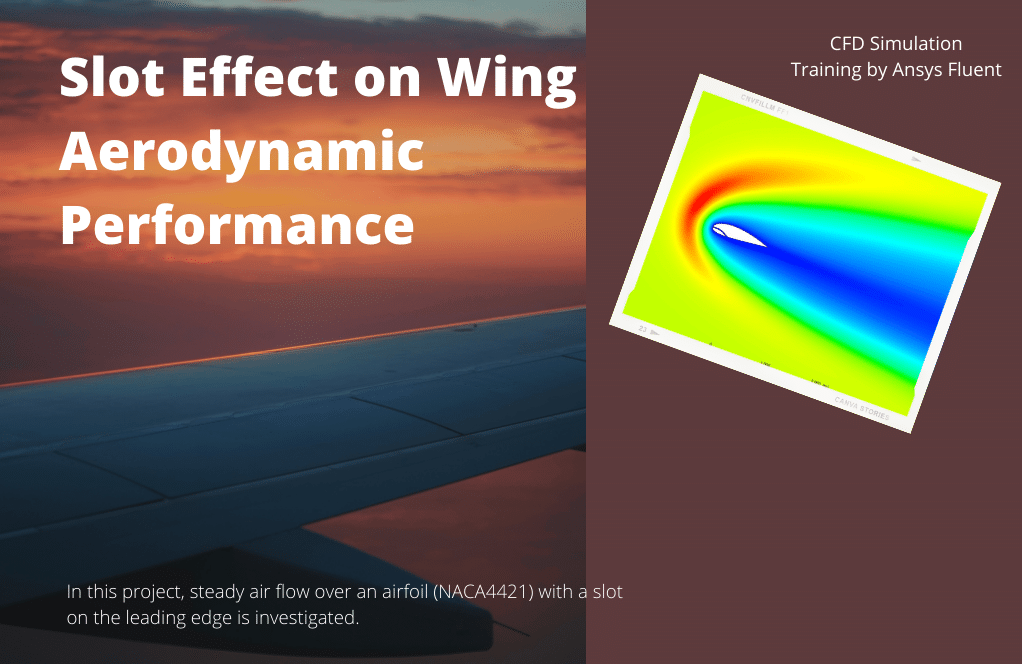
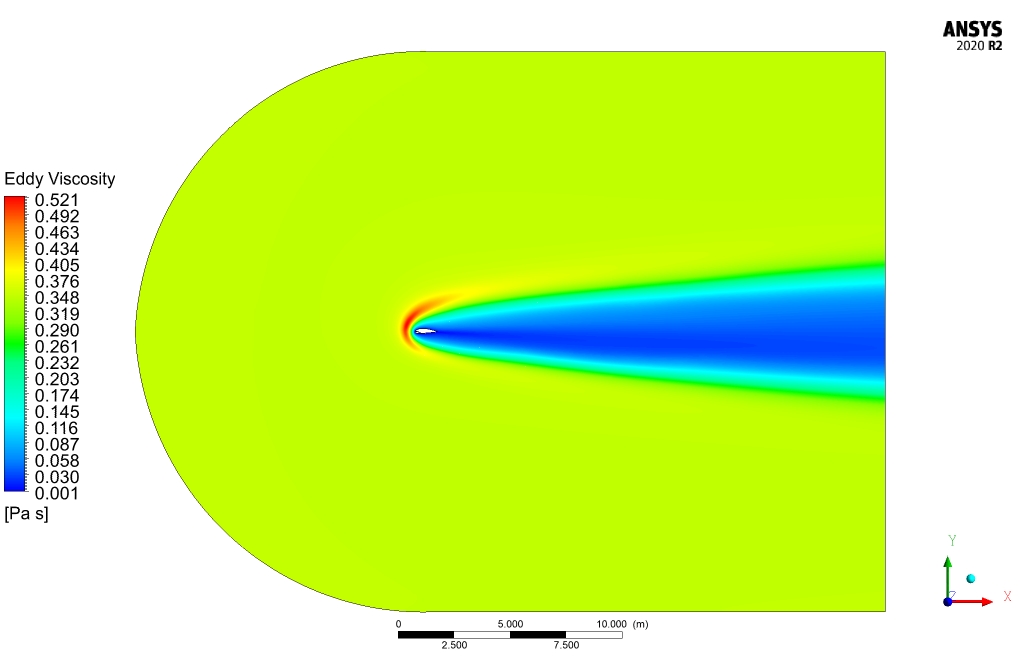
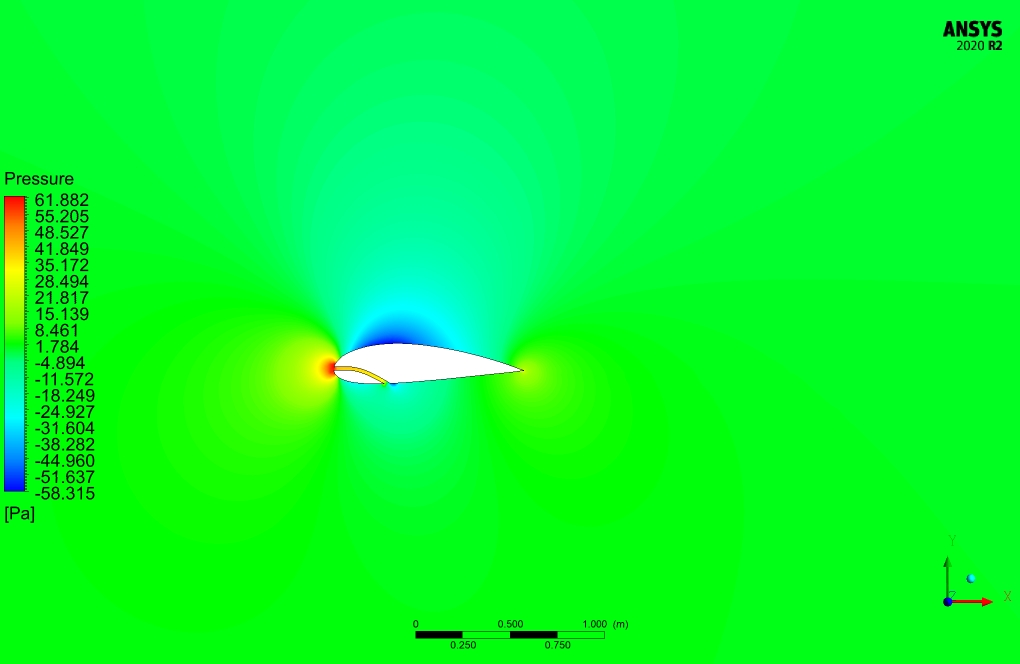
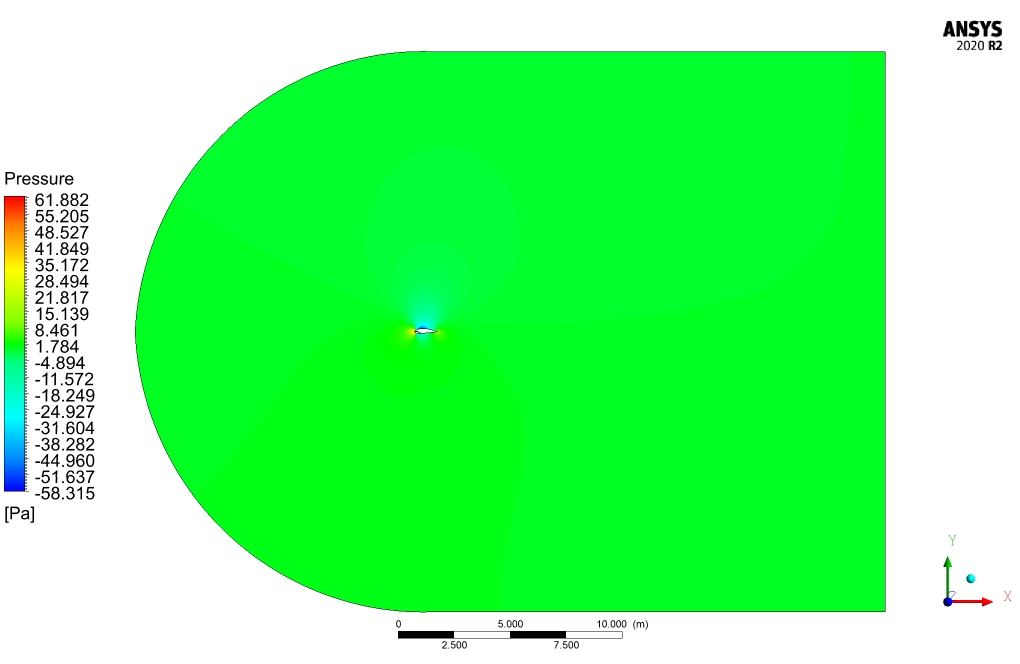
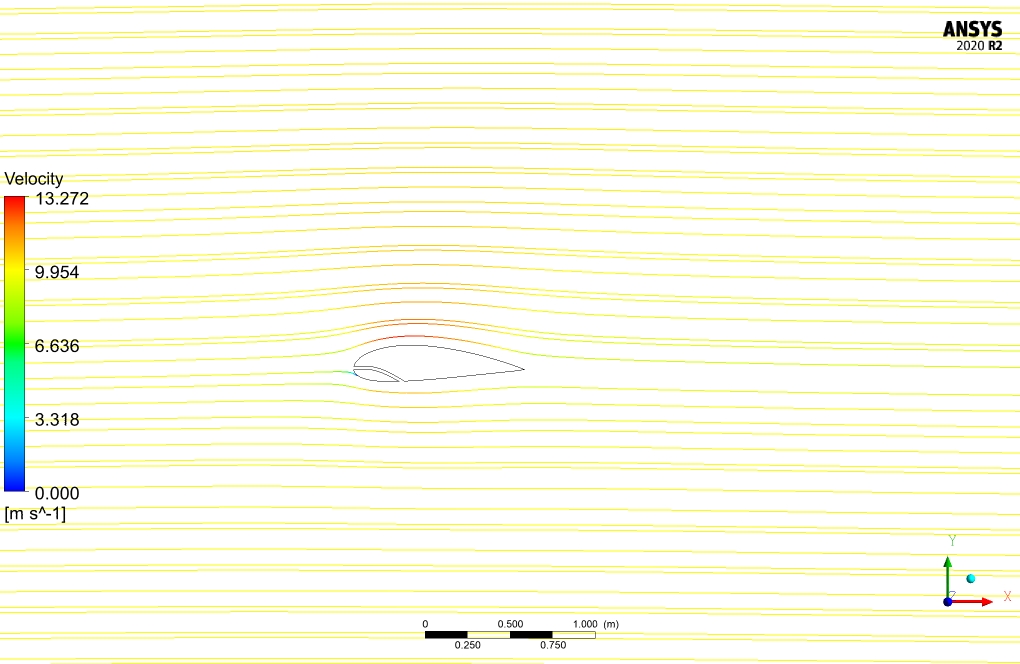
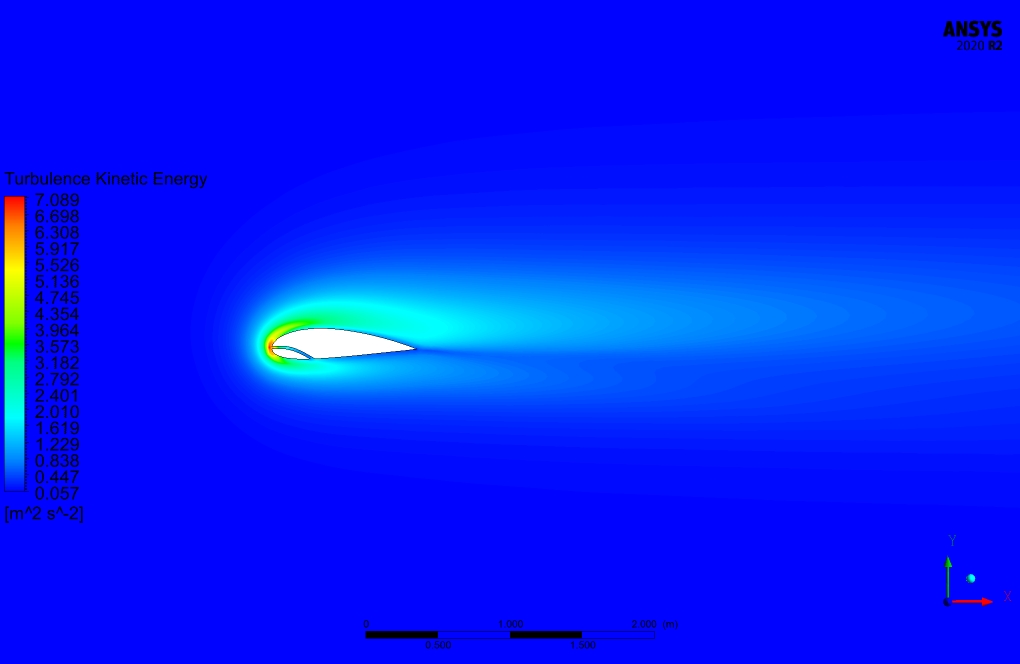
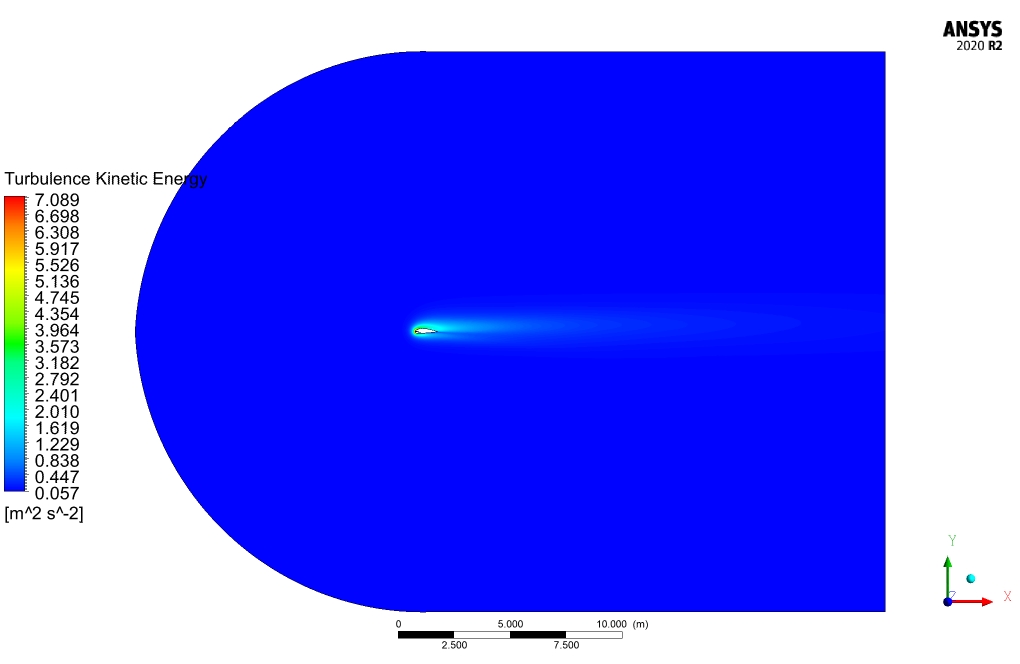
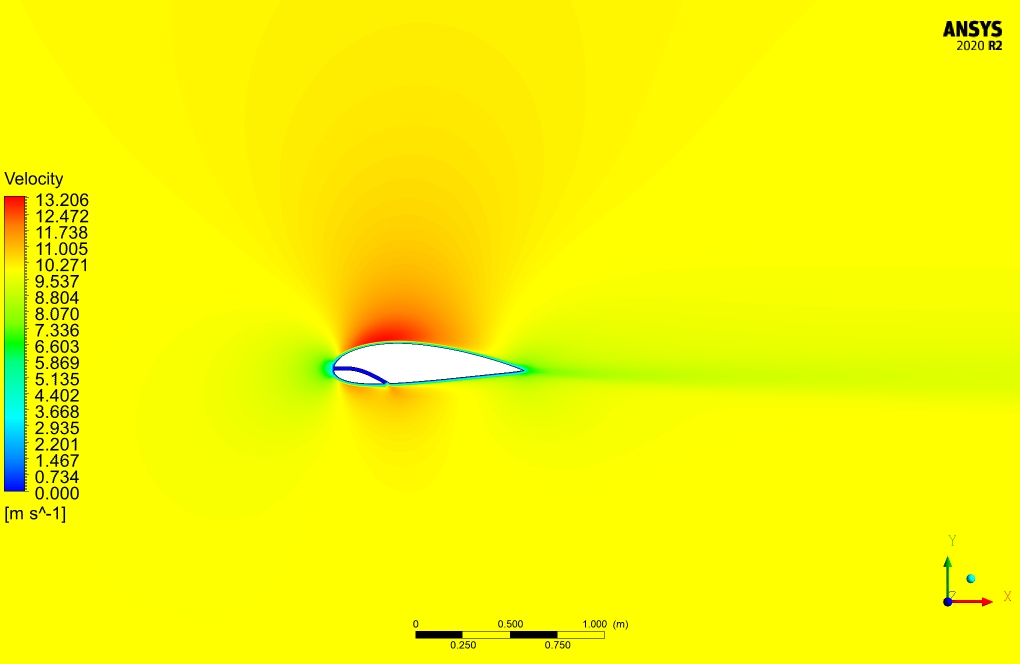
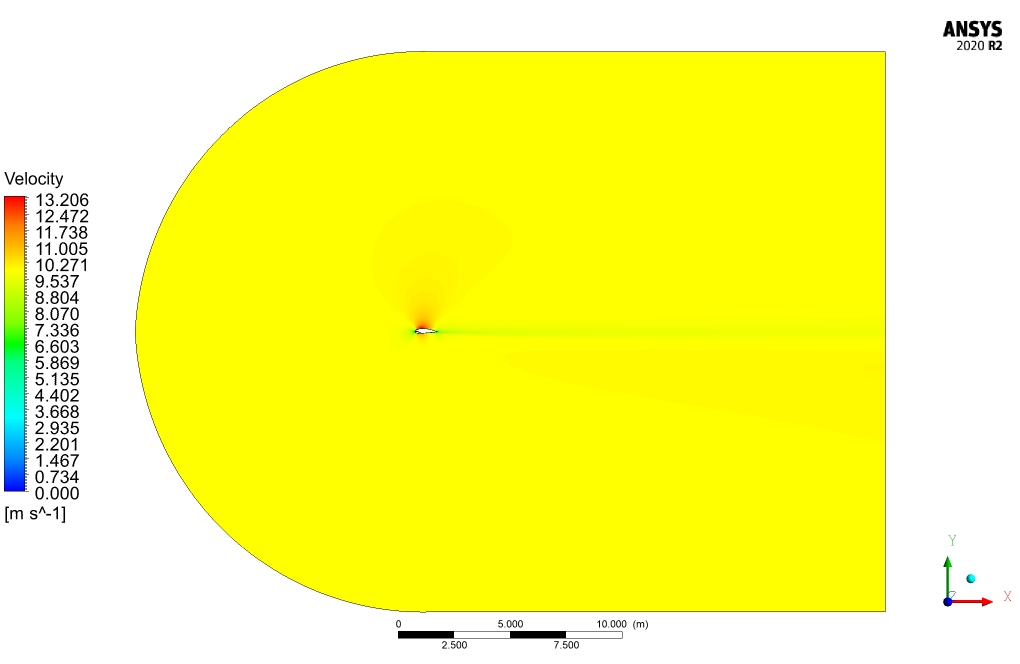
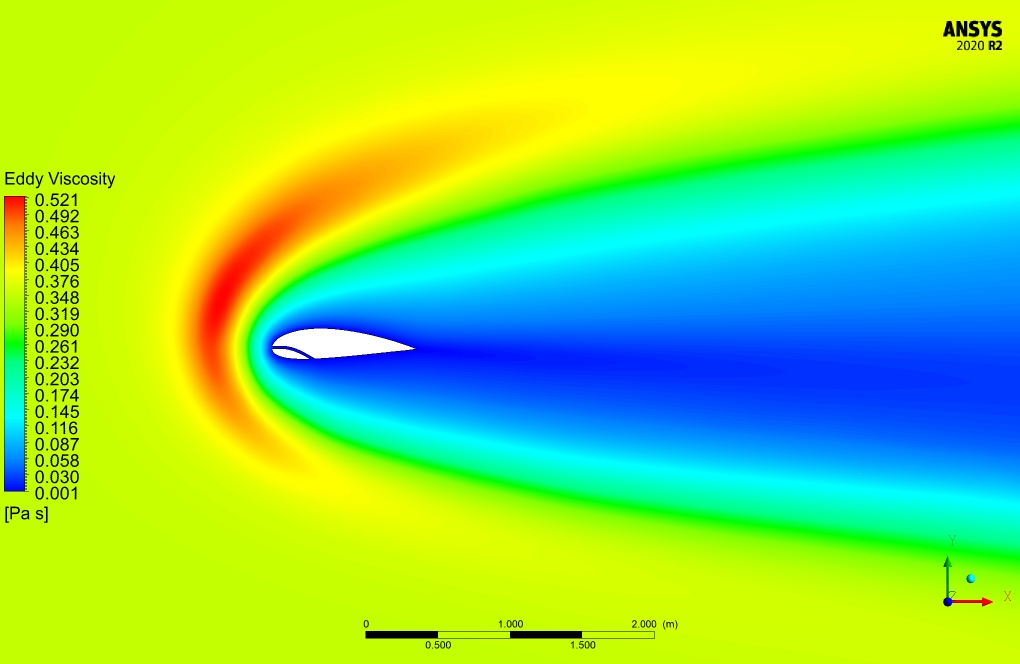


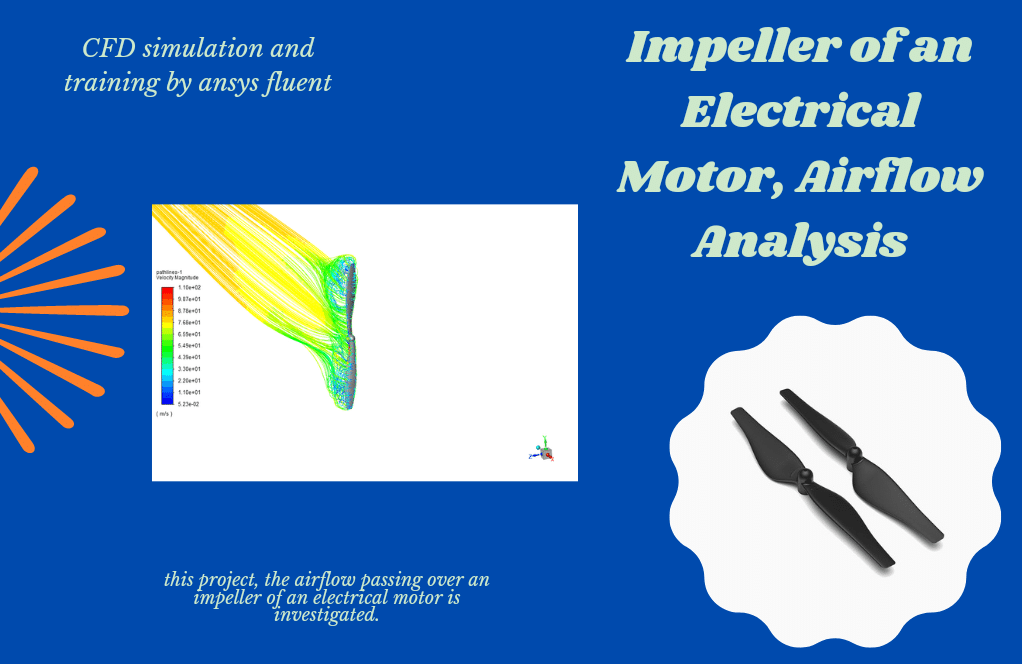

Adelle Bogisich Sr. –
I’m fascinated by the increased lift coefficient! Has any further analysis been conducted to understand which specific changes in airflow, due to the slot, are contributing to this improvement in performance?
MR CFD Support –
The presence of the slot on the leading edge of the airfoil alters the air flow pattern, allowing higher lift to be generated. Detailed analysis such as examining flow separation, pressure distribution, and the boundary layer development could reveal more insight into how exactly the slot is affecting the airflow to improve the aerodynamic performance.
Mr. Tommie Corwin –
I was very impressed by the thorough CFD analysis of the slot’s effect on wing aerodynamics. It was fascinating to see how much the presence of the slot could increase the lift coefficient from 0.1 to 0.3764! Great insight on improved airfoil performance!
MR CFD Support –
We appreciate your compliments on our CFD analysis of the slot’s impact on wing aerodynamics. It’s gratifying to know that our detailed study provided you with valuable insights. Thank you for recognizing our efforts to present comprehensive and understandable simulations!
Mr. Brenden Schimmel –
The analysis you explained was thorough and educational. I was impressed by how the slot affected the aerodynamics of the wing. Is there a specific reason why a NACA4421 airfoil was chosen for this study?
MR CFD Support –
We chose the NACA4421 airfoil for this study due to its common use in aircraft design and its typical aerodynamic characteristics that allow us to analyze the effects of modifications like the slot efficiently.
Sid Harber –
As a complete novice in aerodynamics, I must say I’m impressed by what the slot has achieved! The increased lift force thanks to this simulation shows great promise for aviation design. Could you please elaborate more on how the slot affects airflow past the airfoil which contributes to the increased lift force?
MR CFD Support –
Thank you for your kind words! Certainly, the slot on the airfoil modifies the airflow in a way that increases the wing’s lift. Specifically, the slot helps redistribute the air pressure across the airfoil surface and enhance the airflow adherence to the wing during conditions that would otherwise lead to airflow separation. This delays the stall and consequently provides additional lift at those critical moments, especially at lower speeds and sharper angles of attack. Essentially, the slot acts as a passive flow control mechanism, allowing for smoother and more consistent lift characteristics.
Queenie Lynch –
Absolutely impressed with the detailed investigation on the slot effect on wing aerodynamics. The comprehensive analysis and presentation of drag and lift coefficients provide valuable insights. Great use of the k-epsilon model to articulate the flow patterns and pressure distributions. Well done!
MR CFD Support –
Thank you for your enthusiastic feedback! We’re delighted to hear that you’ve found our investigation on the slot effect exhaustive and insightful. We always strive to deliver high-quality CFD projects that reveal critical insights and we’re glad that our efforts have been beneficial to you. We appreciate your recognition of the use of the k-epsilon model and our analysis approach. Looking forward to providing you with more quality simulations!
Prof. Trinity Gislason Sr. –
I am very impressed by how the slot affects the aerodynamic performance of the wing. It’s fascinating to see a slight modification can lead to drastic changes. The detail provided in the simulation results indicates a comprehensive analysis.
MR CFD Support –
Thank you so much for your positive feedback! We’re glad to hear that you found the simulation results and the effect of the slot on the wing’s aerodynamics fascinating. It’s always encouraging to hear that our customers appreciate the depth and comprehensiveness of our analysis. If you ever have any questions or need further information, don’t hesitate to reach out. Thank you for choosing our training for your learning needs!
Prof. Enrique Hartmann Jr. –
This training material on simulating slot effects appears very comprehensive. The explanation of methodology and conclusion provides clarity on the benefits of using a slot in an airfoil. It’s exciting to see a project like this enhance one’s understanding of aerodynamics and the manipulation of lift and drag through design modifications. Top-notch simulation work!
MR CFD Support –
We’re delighted to hear that you found the simulation training on the slot effect on wing aerodynamics insightful and beneficial. Your acknowledgment of the methodology and conclusion is appreciated, and it’s great to know that the training contributed positively to your understanding of aerodynamics. Thank you for your positive feedback!
Veronica Tremblay –
This training was fantastic! The detailed approach to simulating the NACA4421 airfoil with a slot effect was incredibly informative. Seeing how the slot increased both lift and drag coefficients really enriched my understanding of airfoil design. The visual contours and explanation of stagnation points were particularly impressive. Thanks for providing such a thorough exploration into wing aerodynamics!
MR CFD Support –
Thank you for your positive feedback! We’re delighted to hear that you found the NACA4421 airfoil simulation training valuable and informative. It’s great to know that the visualisations and data provided enhanced your understanding of aerodynamic concepts. We appreciate your compliments and are always here to support your journey into CFD analysis!
Dewayne Sauer Jr. –
The slot seems to increase both lift and drag; is the trade-off considered beneficial for certain kinds of flight conditions?
MR CFD Support –
Yes, the slot is generally beneficial for specific flight conditions, such as low-speed operations and takeoff, where increased lift is crucial, even at the expense of increased drag. It helps to prevent stall and maintain control at high angles of attack.
Prof. Emilio Emard –
The training was amazing! The effects of the slot on the wing’s aerodynamic performance were demonstrated very clearly through the simulations. The results indicating how the slot increased both drag and lift coefficients shed light on how slots can be used in improving airfoil performance. This knowledge is especially valuable in aircraft design. Thanks for a great learning experience!
MR CFD Support –
Thank you so much for your kind feedback! We’re thrilled to know that you found the training effective and that it provided valuable insights into the role of slots in wing aerodynamics. It’s always rewarding to hear when our products help customers understand complex aerodynamic concepts better. If you ever have more queries or need further training on other applications, don’t hesitate to ask. We’re here to help you learn and grow in the field of CFD simulation!
Annamarie Stracke III –
The use of a slot has increased both the drag and lift coefficients significantly when compared to an airfoil without a slot. Do you have any advice for a situation where reducing drag is more important but still maintaining some lift increase?
MR CFD Support –
To balance the increase in lift while controlling the increase in drag, you could consider altering the slot size or position, as different configurations can lead to different aerodynamic characteristics. It’s also possible to optimize the airfoil’s shape and surface finish or use other flow control techniques such as vortex generators or boundary layer control methods. Computational fluid dynamics analyzes various configurations to find the best compromise for your specific needs.
Nannie Smitham –
I’m genuinely impressed with the insight provided on the slot effect for improving aerodynamic performance. Very thorough analysis with clear conclusive results!
MR CFD Support –
Thank you for your positive feedback. We’re glad you found the analysis thorough and insightful. Our goal is to provide comprehensive knowledge that is helpful for our customers. If you need any more information on aerodynamics or any other topic, please do not hesitate to reach out!
Lilly Runte –
The CFD simulation of the slotted NACA4421 airfoil is fascinating. The increase in both lift and drag coefficients showcases the impact of the slot. I am intrigued to know how the pressure distribution varies around the slotted section compared to the rest of the airfoil.
MR CFD Support –
Indeed, the presence of a slot on the airfoil can significantly alter the pressure distribution. Around the slotted section, you would generally find increased local turbulence and vorticity, causing a different pressure pattern. Such an area experiences higher pressure than the surrounding regions due to the deceleration of air as it navigates around the slot, affecting overall aerodynamic performance. The CFD simulation will showcase detailed pressure contours providing insights into these changes including the stagnation point shifting and potential separation points on the airfoil’s surface.
Diamond Feest –
The illustrations of aerodynamic performance were as clear as the skies an airfoil would navigate through. Impressed by the clarity and detail in the simulation – the slot effect has never been clearer to me. Kudos to the MR CFD team for a job well done!
MR CFD Support –
Thank you for your kind words! We’re thrilled to know that our simulation on the effect of a slot on wing aerodynamics was both informative and clear. Your feedback is greatly appreciated and motivates us to continue delivering high-quality CFD learning materials and simulations. If you have further interest in any particular aspect or need assistance with other CFD challenges, feel free to reach out.
Madison Klocko –
I’m extremely satisfied with how well the slot effect was demonstrated on the wing aerodynamics. It was illuminating to see the tangible increase in lift and drag due to the slot, along with the detailed pressure and velocity contours. Great job on providing a thorough and clear analysis!
MR CFD Support –
Thank you for your positive feedback! We’re thrilled to hear that you found the analysis on the wing aerodynamics with the slot effect comprehensive and helpful. It’s always our goal to provide clear and practical insights through our simulations. If you have any further questions or need further assistance, feel free to reach out!
Golda Friesen –
I noticed significant changes in the lift coefficient due to the slot. Can you explain how does the slot affect the airfoil’s performance so dramatically?
MR CFD Support –
The slot modifies the airflow pattern around the airfoil, which can delay airflow separation in certain conditions. This delays stall and improves lift by promoting smoother flow over the wingspan. The increased coanda effect due to the high-energy air directed from the slot over the wing surface is responsible for the dramatic increase in lift. Additionally, while drag is increased, the improvement in lift-to-drag ratio at certain angles could make this a beneficial modification for specific applications.
Raphaelle Kemmer –
Great insight on wing performance! Does the course go into detail on how the slot affects the transition from laminar to turbulent flow?
MR CFD Support –
In this training, we cover the influence of the slot on the airflow characteristics, including changes in the aerodynamic performance of the wing. Concepts like laminar to turbulent transition are discussed within the context of how the slot impacts the lift and drag forces.
Prof. Kamille Kreiger –
I’m pleased with the detailed explanation provided for the slot effect on wing aerodynamics. The performance increases illustrated by the lift and drag coefficients were especially enlightening. Keep up the good work!
MR CFD Support –
Thank you for your positive feedback! We’re glad to hear that the explanation of the slot effect on wing aerodynamics and the impact on lift and drag coefficients was helpful and informative. We strive to provide detailed and clear insights into all of our simulations. Your appreciation motivates us to continue delivering high-quality CFD training products!
Dr. Bud Cole MD –
This training on slot effect was outstanding! It was mind-blowing to see how a small feature like a slot greatly impacts the wing’s performance.
MR CFD Support –
Thank you very much for the positive feedback! We’re thrilled you found the training on the slot effect insightful and how it significantly enhances the aerodynamic performance of a wing. If you have any further questions or need additional insights, please let us know. We always strive to provide valuable learning experiences. Happy learning!
Catalina Becker MD –
I’m impressed with how the slot on the wing influences both the drag and lift coefficients compared to an airfoil without a slot.
MR CFD Support –
Thank you for your kind words! It’s indeed fascinating to see the aerodynamic effects of modifying an airfoil design. We’re glad that the simulation insights were informative and clearly presented the impact of the slot on wing performance.
Bert Kihn III –
What would be the impact on performance if we changed the airfoil’s attack angle? Can the simulation be adjusted accordingly to evaluate that?
MR CFD Support –
Altering the airfoil’s attack angle would directly affect the lift and drag forces. Yes, the simulation can be adjusted to evaluate the impact of different attack angles. By providing the airflow with an angle relevant to the airfoil’s chord, we can observe corresponding changes in the aerodynamic coefficients and pressure distribution.
Bridie Schuster –
The slot effect training was truly enlightening. The way you showed the impact of slots on lift and drag through the simulation was incredibly easy to follow and understand.
MR CFD Support –
Thank you for your kind words! We’re thrilled to hear that the simulation helped you understand the aerodynamic performance effects of a slot on an airfoil. Your appreciation means a lot to us, and we hope our products continue to support your learning journey.
Mr. Jaden Schaden –
I’m super impressed by how the slot effect enhances lift on the airfoil. The improvement on both lift and drag coefficients sounds important for aerospace design!
MR CFD Support –
Thank you for the positive feedback! We are delighted to hear that you appreciate the significance of the slot effect on wing aerodynamics. It indeed plays a crucial role in the design and optimization of aircraft components. If you have any further inquiries or need more insights on our simulation training, please do not hesitate to reach out!
Dr. Grayce Legros –
This training module seems comprehensive and very practical. The increase in lift due to the slot effect is quite interesting. Brilliant work by MR CFD in elaborating on such aerodynamic optimization!
MR CFD Support –
Thank you for your positive feedback! We’re thrilled to hear you found the training on the slot effect and its impact on aerodynamic performance useful and insightful. At MR CFD Company, we always strive to provide detailed and practical knowledge that aids in understanding complex aerodynamic concepts. If you have any more questions or need further assistance, feel free to reach out!
Easton Fadel IV –
I’m particularly interested in how the slot contributes to the increase in lift. Could you please provide more insight on this?
MR CFD Support –
The slot on the leading edge of the airfoil creates a passage that allows some of the higher pressure airflow from below the wing to move to the top surface. This energizes the airflow on the top, delaying airflow separation and thus reducing the stall angle or enabling higher angles of attack. This helps in maintaining smoother airflow over the wing, resulting in an increase in lift. The slotted airfoil in this simulation therefore shows a higher lift coefficient compared to one without a slot.
Trinity Boyer –
I am thoroughly impressed with how the slot on the airfoil enhances the lift without a significant increase in drag coefficient. The understanding of stagnation points and the detailed analysis of drag and lift forces displayed in this simulation are invaluable for students like myself. Great job!
MR CFD Support –
Thank you so much for your kind words about our Slot Effect on Wing Aerodynamic Performance training material. We are thrilled to hear you found the simulation and analysis beneficial for your understanding of aerodynamics. It’s always a pleasure to receive feedback like this from our students!
Vaughn Grant –
The increase in both drag and lift due to the slot is quite interesting. Can you provide some insight into how the presence of the slot affects the flow separation?
MR CFD Support –
The slot allows some of the high-pressure air from the bottom surface of the wing to flow to the upper surface. This energizes the boundary layer on top of the wing, delaying flow separation and allowing the airfoil to generate more lift at a given angle of attack. Additionally, it helps in increasing the critical angle of attack, meaning the wing can be tilted further into the airflow before experiencing a stall.